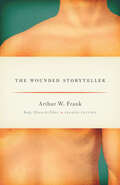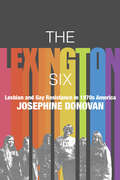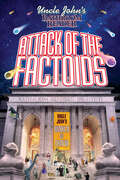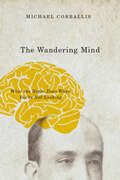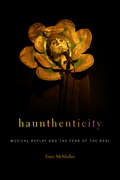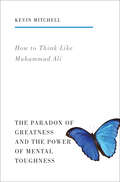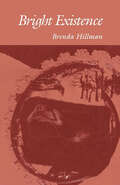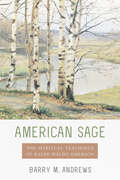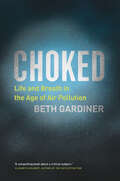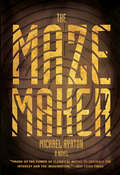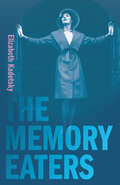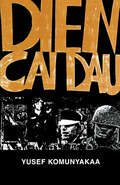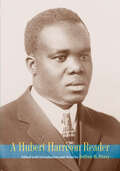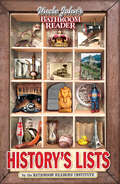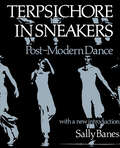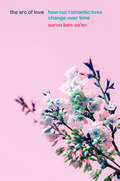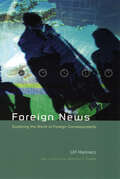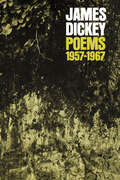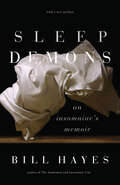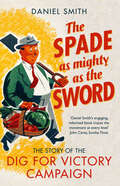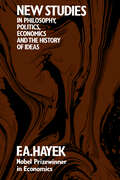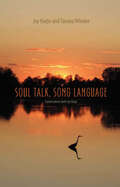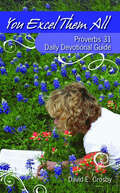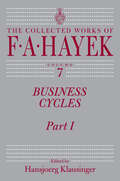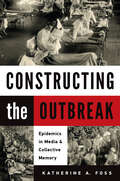- Table View
- List View
The Wounded Storyteller: Body, Illness & Ethics
by Arthur W. FrankUpdated second edition: “A bold and imaginative book which moves our thinking about narratives of illness in new directions.” —Sociology of Heath and IllnessSince it was first published in 1995, The Wounded Storyteller has occupied a unique place in the body of work on illness. A collective portrait of a so-called “remission society” of those who suffer from illness or disability, as well as a cogent analysis of their stories within a larger framework of narrative theory, Arthur W. Frank’s book has reached a large and diverse readership including the ill, medical professionals, and scholars of literary theory.Drawing on the work of such authors as Oliver Sacks, Anatole Broyard, Norman Cousins, and Audre Lorde, as well as from people he met during the years he spent among different illness groups, Frank recounts a stirring collection of illness stories, ranging from the well-known—Gilda Radner’s battle with ovarian cancer—to the private testimonials of people with cancer, chronic fatigue syndrome, and disabilities. Their stories are more than accounts of personal suffering: They abound with moral choices and point to a social ethic.In this new edition Frank adds a preface describing the personal and cultural times when the first edition was written. His new afterword extends the book’s argument significantly, discussing storytelling and experience, other modes of illness narration, and a version of hope that is both realistic and aspirational. Reflecting on his own life during the creation of the first edition and the conclusions of the book itself, he reminds us of the power of storytelling as way to understand our own suffering.“Arthur W. Frank’s second edition of The Wounded Storyteller provides instructions for use of this now-classic text in the study of illness narratives.” —Rita Charon, author of Narrative Medicine“Frank sees the value of illness narratives not so much in solving clinical conundrums as in addressing the question of how to live a good life.” —Christianity Today
The Lexington Six: Lesbian and Gay Resistance in 1970s America
by Josephine DonovanOn September 23, 1970, a group of antiwar activists staged a robbery at a bank in Massachusetts, during which a police officer was killed. While the three men who participated in the robbery were soon apprehended, two women escaped and became fugitives on the FBI's Ten Most Wanted list, eventually landing in a lesbian collective in Lexington, Kentucky, during the summer of 1974. In pursuit, the FBI launched a massive dragnet. Five lesbian women and one gay man ended up in jail for refusing to cooperate with federal officials, whom they saw as invading their lives and community. Dubbed the Lexington Six, the group's resistance attracted national attention, inspiring a nationwide movement in other minority communities. Like the iconic Stonewall demonstrations, this gripping story of spirited defiance has special resonance in today's America. Drawing on transcripts of the judicial hearings, contemporaneous newspaper accounts, hundreds of pages of FBI files released to the author under the Freedom of Information Act, and interviews with many of the participants, Josephine Donovan reconstructs this fascinating, untold story. The Lexington Six is a vital addition to LGBTQ, feminist, and radical American history.
Uncle John's Bathroom Reader: Bizarre Bites Of Incredible Information (Uncle John's Bathroom Reader)
by Bathroom Readers' InstituteBite-sized bits of information to give you the edge on trivia night—from crime and punishment to the rich and famous to ghosts, ghouls, oddballs, and more! Packed with more than 400 pages, Uncle John&’s Bathroom Reader: Attack of the Factoids is a fact-a-palooza of obscure information. Like what, you ask? Here are just a few extraordinary examples:* Bats always turn left when they exit a cave.* In the 1960s, astronauts trained for moon voyages by walking on Hawaiian lava fields.* Lloyd&’s of London insured Bruce Springsteen&’s voice for 3.5 million English pounds.* Physician Amynthas of Alexandria, Greece, performed the first known nose job in the Third Century B.C.* Military toilet paper is printed in a camouflage design, since white could attract enemy fire.* Elvis Presley always wore a helmet when watching football on TV.* King Henry VIII&’s ladies at court had a ration of one gallon of beer per day.* It takes the energy from fifty leaves on an apple tree to produce one ripe fruit.* The only country to host the Summer Olympics but not win a single gold medal was Canada, in 1976. And that&’s just the beginning! So what are you waiting for? Attack!
The Wandering Mind: What the Brain Does When You're Not Looking
by Michael CorballisRooted in neuroscience, psychology and evolutionary biology, this study explores what happens when we stop paying attention and the effect on our behavior.If we’ve done our job well—and, let’s be honest, if we’re lucky—you’ll read to the end of this description. Most likely, however, you won’t. Somewhere in the middle of the next paragraph, your mind will wander off. Minds wander. That’s just how it is.That may be bad news for me, but is it bad news for people in general? Does the fact that as much as fifty percent of our waking hours find us failing to focus on the task at hand represent a problem? Michael Corballis doesn’t think so. With The Wandering Mind, he shows us why, rehabilitating woolgathering and revealing its incredibly useful effects. Drawing on the latest research from cognitive science and evolutionary biology, Corballis shows us how mind-wandering not only frees us from moment-to-moment drudgery, but also from the limitations of our immediate selves. Mind-wandering strengthens our imagination, fueling the flights of invention, storytelling, and empathy that underlie our shared humanity; furthermore, he explains, our tendency to wander back and forth through the timeline of our lives is fundamental to our very sense of ourselves as coherent, continuing personalities.Full of unusual examples and surprising discoveries, The Wandering Mind mounts a vigorous defense of inattention—even as it never fails to hold the reader’s.Praise for The Wandering Mind“[A] conversational, sincere and amusing book about the tendency of our minds to stray from whatever it is we are actually supposed to be focusing on. . . . [An] engaging exploration of the subject.” —Times Higher Education, Book of the Week“Michael Corballis, the scientist, takes you by the hand and weaves through an avalanche of information from psychology, literature, history, and more to elucidate my favorite mental state—mind wandering. His high capacity for erudition, lucidity, and warmth have never shined more brightly.” —Michael S. Gazzaniga“The Wandering Mind is a pleasure to read—a lively book that will appeal to a broad spectrum of readers.” —Thomas Suddendorf, author of The Gap
Haunthenticity: Musical Replay and the Fear of the Real (Music / Culture Ser.)
by Tracy McMullenAn interdisciplinary and existential exploration of live musical reenactment In this persuasive study, Tracy McMullen draws on philosophy, psychology, musicology, performance studies, and popular music studies in order to analyze the rise of obsessively precise live musical reenactments in the United States at the turn of the millennium. She investigates this practice, what she terms, Replay, in popular music, jazz, and performance art arguing that it is a symptom of deep-seated fears of the fleeting nature of identity. Musical Replay claims a type of authenticity that is grounded in the exact material details of the original (instruments, props, costumes, people, etc.), and attempts to make up for the loss of identity: cloning the past and using it as a replacement. The scholarship is wide-ranging and ties theory and evidence from diverse fields and experiences together seamlessly and convincingly. Haunthenticity: Musical Replay and the Fear of the Real ultimately argues for a new way of conceiving subjectivity and identity within critical and cultural studies, moving beyond Western epistemologies.
How to Think Like Muhammad Ali: The Paradox of Greatness and the Power of Mental Toughness
by Kevin MitchellA biography of the boxing legend reveals how strategies Ali used for his successful sports career may be applied to business or personal endeavors. Muhammad Ali is the most famous boxer in the history of the sport. Three-time World Champion and the thorn in the side of Vietnam-era America, he became a moral beacon at a time when America was on its knees.But, for all his pronouncements, Ali rarely revealed the psychological training that went into his preparations before the fights. For the first time, Kevin Mitchell, one of the pre-eminent boxing writers of his generation, will get behind the public persona to reveal the psychological advantage that Ali was able to take to the ring. Mitchell demonstrates how the mental preparation Ali put into winning the heavyweight title three times are essential skills that can be applied to any walk of professional life.From the classic tactic of the rope-a-dope that Ali applied to the infamous “Rumble in the Jungle” against the favorite George Foreman, to the visualization techniques Ali applied to every fight—by having the Round number he was going to knock his opponent out in written on his taped hands—Mitchell reveals how Ali can teach something to us all and how his lessons can be applied to business and personal life equally.
Bright Existence (Wesleyan Poetry Series)
by Brenda HillmanA celebrated poet's vision of our dynamic universe. The poems in Brenda Hillman's new collection, a companion volume to her recent Death Tratates, offer a dynamic vision of a universe founded on the tensions between light and dark , existence and non-existence, male and female, spirit and matter. Informed in part by Gnostic concepts of the separate soul in search of its divine origins ("spirit held by matter"). This dualistic vision is cast in contemporary terms and seeks resolution of these tensions through acceptance.
American Sage: The Spiritual Teachings of Ralph Waldo Emerson
by Barry M. Andrews&“Succeeds in making Emerson&’s ideas and recommended spiritual practices accessible. . . . [For] those interested in nineteenth-century American spiritualism.&” —Publishers Weekly Even during his lifetime, Ralph Waldo Emerson was called the Sage of Concord, a fitting title for this leader of the American Transcendentalist movement. Everything that Emerson said and wrote directly addressed the conduct of life, and in his view, spiritual truth and understanding were the essence of religion. Unsurprisingly, he sought to rescue spirituality from decay, eschewing dry preaching and rote rituals. Unitarian minister Barry M. Andrews has spent years studying Emerson, finding wisdom and guidance in his teachings and practices, and witnessing how the spiritual lives of others are enriched when they grasp the many meanings in his work. In American Sage, Andrews explores Emerson's writings, including his journals and letters, and makes them accessible to today's spiritual seekers. Written in everyday language and based on scholarship grounded in historical detail, this enlightening book considers the nineteenth-century religious and intellectual crosscurrents that shaped Emerson's worldview to reveal how his spiritual teachings remain timeless and modern, universal and uniquely American. &“An ideal companion for readers working through Emerson's essays, a reading group on spirituality, and any number of classroom situations.&” —David M. Robinson, author of Emerson and the Conduct of Life: Pragmatism and Ethical Purpose in the Later Work &“In a style that is both scholarly and highly readable, Andrews offers an insightful account of Emerson's teachings. . . . demonstrating how his ideas are relevant to readers of today who are poised between faith and unbelief.&” —Phyllis Cole, author of Mary Moody Emerson and the Origins of Transcendentalism: A Family History
Choked: Life and Breath in the Age of Air Pollution
by Beth Gardiner“[An] arresting account of one of the biggest environmental threats to human health.” —Scientific AmericanAir pollution prematurely kills seven million people every year, including more than one hundred thousand Americans. It is strongly linked to strokes, heart attacks, many kinds of cancer, dementia, and premature birth, among other ailments. In Choked, Beth Gardiner travels the world to tell the story of this modern-day plague, taking readers from the halls of power in Washington and the diesel-fogged London streets to Poland’s coal heartland and India’s gasping capital. In a gripping narrative, she exposes the political decisions and economic forces that have kept so many of us breathing dirty air. This is a moving, up-close look at the human toll, where we meet the scientists who have transformed our understanding of pollution’s effects on the body and the ordinary people fighting for a cleaner future.“A compelling book about a critical subject.” —Elizabeth Kolbert, Pulitzer Prize–winning author of The Sixth Extinction“Illuminates some disturbing realities, but it also gives us hope by showing us what we can do to clean our air. . . . An urgent, essential read.” —Arnold Schwarzenegger“Moving . . . By putting a human face on a problem of environmental chemistry, Gardiner shows us the devastation up close, creating a sense of dismay but also urgency to improve lives.” —Washington Post“Timely, eloquent, and disturbing.” —Nature“You couldn’t ask for a better guide for nonspecialists and concerned citizens.” —Guardian, Best Book of the Year“Remarkable.” —Science“Brilliantly reported and beautifully written.” —Anna Clark, author of The Poisoned City
The Maze Maker: A Novel
by Michael Ayrton“A book of rich texture and memorable qualities. It belongs with the work of such other fine modern interpreters of myth as Mary Renault and Robert Graves.” —The Wall Street Journal“I address you across more than three thousand years, you who live at the conjunction of the Fish and the Water-carrier,” speaks Daedalus, an artisan, inventor, and designer born into an utterly alien family of heroes who value acts of war above all else, a world where his fellow Greeks seem driven only to destroy—an existence he feels compelled to escape.In this fictional autobiography of the father of Icarus, “Apollo’s creature,” a brilliant but flawed man, writer and sculptor Michael Ayrton harnesses the tales of the past to mold a myth for our times. We learn of Daedalus’s increasingly ambitious artifacts and inventions; his fascination with Minoan culture, commerce, and religion, and his efforts to adapt to them; how he comes to design the maze of the horned Minotaur; and how, when he decides that he must flee yet again, he builds two sets of wax wings—wings that will be instruments of his descent into the underworld, a place of both purgatory and rebirth.A compelling mix of history, fable, lore, and meditations on the enigma of art, The Maze Maker will ensnare classicists, artists, and all lovers of story in its convolutions of life and legend. “I never understood the pattern of my life,” writes Daedalus, “so that I have blundered through it in a maze.”“Proof of the power of classical myths to rekindle the interest and the imagination.” —The New York Times“[A] beautiful, cruel, and fascinating re-creation of the Daedalus-Icarus myth.” —Publishers Weekly
The Memory Eaters (Juniper Prize for Creative Nonfiction)
by Elizabeth KadetskyOn autopsy, the brain of an Alzheimer's patient can weigh as little as 30 percent of a healthy brain. The tissue grows porous. It is a sieve through which the past slips. As her mother loses her grasp on their shared history, Elizabeth Kadetsky sifts through boxes of the snapshots, newspaper clippings, pamphlets, and notebooks that remain, hoping to uncover the memories that her mother is actively losing as her dementia progresses. These remnants offer the false yet beguiling suggestion that the past is easy to reconstruct—easy to hold. At turns lyrical, poignant, and alluring, The Memory Eaters tells the story of a family's cyclical and intergenerational incidents of trauma, secret-keeping, and forgetting in the context of 1970s and 1980s New York City. Moving from her parents' divorce to her mother's career as a Seventh Avenue fashion model and from her sister's addiction and homelessness to her own experiences with therapy for post-traumatic stress disorder, Kadetsky takes readers on a spiraling trip through memory, consciousness fractured by addiction and dementia, and a compulsion for the past salved by nostalgia.
Dien Cai Dau (Wesleyan Poetry Ser.)
by Yusef KomunyakaaThis collection by the Pulitzer Prize-winning poet is &“a major contribution to the body of literature grappling with Vietnam&” (Poetry). Yusef Komunyakaa is renowned for his ability to blend memory and history with strikingly evocative poetic imagery. Born in the rural community of Bogalusa, Louisiana, Komunyakaa served in Vietnam as a correspondent and editor of The Southern Cross and received a Bronze Star for his service as a journalist. In Dien Cai Dau, he applies this unique sensibility to his experience of the Vietnam War. The resulting poems have been called some of the finest Vietnam testimony ever documented in verse or prose. &“So finely tuned are Komunyakaa&’s images, so faultless his vision, that the reader sees precisely what the poet recalls . . . A powerful must-read for those who have forgotten those days.&” ―Booklist
A Hubert Harrison Reader
by Hubert HarrisonThis volume &“fill[s] a gap in our understanding of black radical and nationalist writings [and] will . . . change the way . . . we tend to look at black thought.&” —Ernest Allen, Jr., W.E.B. DuBois Department of Afro-American Studies, University of Massachusetts at Amherst The brilliant writer, orator, educator, critic, and activist Hubert Harrison (1883–1927) is one of the truly important, yet neglected, figures of early twentieth-century America. Known as &“the father of Harlem radicalism,&” and a leading Socialist party speaker who advocated that socialists champion the cause of the Negro as a revolutionary doctrine, Harrison had an important influence on a generation of race and class radicals, including Marcus Garvey and A. Philip Randolph. Harrison envisioned a socialism that had special appeal to African-Americans, and he affirmed the duty of socialists to oppose race-based oppression. Despite high praise from his contemporaries, Harrison's legacy has largely been neglected. This reader redresses the imbalance; Harrison's essays, editorials, reviews, letters, and diary entries offer a profound, and often unique, analysis of issues, events and individuals of early twentieth-century America. His writings also provide critical insights and counterpoints to the thinking of W. E. B. DuBois, Booker T. Washington and Marcus Garvey. The reader is organized thematically to highlight Harrison's contributions to the debates on race, class, culture, and politics of his time. The writings span Harrison's career and the evolution of his thought, and include extensive political writings, editorials, meditations, reviews of theater and poetry, and deeply evocative social commentary. &“Jeff Perry&’s new book on Hubert Harrison's writings and speeches is a timely addition to the scholarship on early Black radicals and on the Harlem Renaissance period. . . . [A] must read.&” —Portia James, Anacostia Museum
Uncle John's Bathroom Reader: History's Lists (Uncle John's Bathroom Reader)
by Bathroom Readers' InstituteLots and lots of lists of quick and quirky historical facts, from the Stone Age to the Internet Age! Leave it to Uncle John to find a new way to make history fun and exciting! This quirky collection of lists is the latest volume in the Bathroom Reader&’s bestselling history series. Over 500 fact-packed pages will breathe life into history&’s most famous (and most unusual) stories. History buffs, trivia hounds, and readers looking for an educational snack will love learning about some of history&’s greatest—and strangest—events. In one great book, you&’ll find: * Two famous pioneering trails * Three one-armed men who lent a hand * Four famous folks who literally died laughing * Five horrifying medieval punishments * Six photographic firsts * Seven hotel rooms where history was made * Eight disgusting secret ingredients * Nine famous trains * Ten places you can&’t go * Eleven disasters that changed the world * Twelve fast food firsts, and much, much more!
Terpsichore in Sneakers: Post-Modern Dance
by Sally BanesA dance critic's essays on post-modern dance. Drawing on the postmodern perspective and concerns that informed her groundbreaking Terpischore in Sneakers, Sally Bane's Writing Dancing documents the background and development of avant-garde and popular dance, analyzing individual artists, performances, and entire dance movements. With a sure grasp of shifting cultural dynamics, Banes shows how postmodern dance is integrally connected to other oppositional, often marginalized strands of dance culture, and considers how certain kinds of dance move from the margins to the mainstream. Banes begins by considering the act of dance criticism itself, exploring its modes, methods, and underlying assumptions and examining the work of other critics. She traces the development of contemporary dance from the early work of such influential figures as Merce Cunningham and George Balanchine to such contemporary choreographers as Molissa Fenley, Karole Armitage, and Michael Clark. She analyzes the contributions of the Judson Dance Theatre and the Workers' Dance League, the emergence of Latin postmodern dance in New York, and the impact of black jazz in Russia. In addition, Banes explores such untraditional performance modes as breakdancing and the "drunk dancing" of Fred Astaire.
The Arc of Love: How Our Romantic Lives Change Over Time
by Aaron Ben-Ze'evIs love best when it is fresh? For many, the answer is a resounding “yes.” The intense experiences that characterize new love are impossible to replicate, leading to wistful reflection and even a repeated pursuit of such ecstatic beginnings. Aaron Ben-Ze’ev takes these experiences seriously, but he’s also here to remind us of the benefits of profound love—an emotion that can only develop with time. In The Arc of Love, he provides an in-depth, philosophical account of the experiences that arise in early, intense love—sexual passion, novelty, change—as well as the benefits of cultivating long-term, profound love—stability, development, calmness. Ben-Ze’ev analyzes the core of emotions many experience in early love and the challenges they encounter, and he offers pointers for weathering these challenges. Deploying the rigorous analysis of a philosopher, but writing clearly and in an often humorous style with an eye to lived experience, he takes on topics like compromise, commitment, polyamory, choosing a partner, online dating, and when to say “I love you.” Ultimately, Ben-Ze’ev assures us, while love is indeed best when fresh, if we tend to it carefully, it can become more delicious and nourishing even as time marches on.
Foreign News: Exploring the World of Foreign Correspondents (Lewis Henry Morgan Lecture Ser.)
by Ulf HannerzForeign News gives us a fascinating, behind-the-scenes look into the practices of the global tribe we call foreign correspondents. Exploring how they work, Ulf Hannerz also compares the ways correspondents and anthropologists report from one part of the world to another. Hannerz draws on extensive interviews with correspondents in cities as diverse as Jerusalem, Tokyo, and Johannesburg. He shows not only how different story lines evolve in different correspondent beats, but also how the correspondents' home country and personal interests influence the stories they write. Reporting can go well beyond coverage of a specific event, using the news instead to reveal deeper insights into a country or a people to link them to long-term trends or structures of global significance. Ultimately, Hannerz argues that both anthropologists and foreign correspondents can learn from each other in their efforts to educate a public about events and peoples far beyond our homelands. The result of nearly a decade's worth of work, Foreign News is a provocative study that will appeal to both general readers and those concerned with globalization.
Poems, 1957–1967: 1957-1967 (Wesleyan Poetry Series)
by James DickeyClassic poems from a famous American poet This volume represents, under one cover, the major work of the man whom critics and readers have designated the authentic poet of his American generation. For this collection, James Dickey has selected from his four published books all those poems that reflect his truest interests and his growth as an artist. He has added more than a score of new poems—in effect, a new book in themselves—that have not previously been published in volume form. Specifically, Poems 1957-1967 contains 15 of the 24 poems that were included in his first book, Into the Stone (1960); 25 of the 36 that made up Drowning With Others (1962); 22 of the 24 in Helmets (1964); the entire 22 in the National Book Award winner Buckdancer's Choice (1965); and, under the titles Sermon and Falling, the exciting new poems mentioned above. Seldom can the word "great" be used of the work of a contemporary in any art. But surely it applies to the poems of James Dickey.
Sleep Demons: An Insomniac's Memoir
by Bill Hayes“A lovely weave of memory and science, great characters and compassionate humor” from the author of Sweat: A History of Exercise (Anne Lamott).We often think of sleep as mere stasis, a pause button we press at the end of each day. Yet sleep is full of untold mysteries—eluding us when we seek it too fervently, throwing us into surreal dream worlds when we don’t, sometimes even possessing our bodies so that they walk and talk without our conscious volition. Delving into the mysteries of his own sleep patterns, Bill Hayes marvels, “I have come to see that sleep itself tells a story.”An acclaimed journalist and memoirist—and partner of the late neurologist Oliver Sacks—Hayes has been plagued by insomnia his entire life. The science and mythology of sleep and sleeplessness form the backbone to Hayes’s narrative of his personal battles with sleep and how they colored his waking life, as he threads stories of fugitive sleep through memories of growing up in the closet, coming out to his Irish Catholic family, watching his friends fall ill during the early years of the AIDS crisis in San Francisco, and finding a lover. An erudite blend of science and personal narrative, Sleep Demons offers a poignant introduction to the topics for which Hayes has since become famous, including art, eros, city life, the history of medical science, and queer identity.“This intimate and beautifully written book brings scientific research alive in a heartfelt and deeply personal narrative.” —The Guardian“Memoir, history, and science come together and apart again in a book that reads very much like a dream.” —Out magazine
The Spade as Mighty as the Sword: The Story of the Dig for Victory Campaign
by Daniel SmithThe little-known history of the “Garden Front”—Britain’s wildly successful vegetable-growing campaign during WWII: “A fascinating story.” —Northern EchoAfter food rationing was introduced in 1940, and German U-boats began threatening merchant shipping bringing in essential foodstuffs, the Ministry of Agriculture decided something had to be done to make the kitchens of Britain more self-sufficient.The result was an amazingly effective campaign—Dig for Victory—encouraging every man and woman to turn their garden, or even the grass verge in their street, over to cultivating vegetables. By 1942 half the population were taking part, and even the Royal Family had sacrificed their rose beds for growing onions.Now, Daniel Smith tells the full story of this remarkable wartime episode when spades, forks, and bean canes became weapons the ordinary citizen could take up against the enemy. It had tangible benefits for the war effort in that shipping could be reallocated for munitions instead of food imports, as well as for the health of the nation in encouraging a diet of fresh fruit and veg. The campaign also created unexpected celebrities like C.H. Middleton, whose wartime BBC radio talks on gardening reached a vast audience, and even sowed the seeds for the modern allotment movement.Ultimately it is a war story without fighting or killing, one that shows how even The Little Man with the Spade, in the words of the Minister for Agriculture at the time, did his bit for Victory.“Engaging.” —The Sunday Times“An inspirational account.” —Lancashire Evening Post
New Studies in Philosophy, Politics, Economics and the History of Ideas
by F. A. HayekFrom a Nobel Laureate economist, a collection of essays outlining ideas on political theory, economic freedom and epistemology.Following on F. A. Hayek’s previous work Studies in Philosophy, Politics, and Economics (1967), New Studies in Philosophy, Politics, Economics and the History of Ideas collects some of Hayek’s most notable essays and lectures dealing with problems of philosophy, politics and economics, with many of the essays falling into more than one of these categories. Expanding upon the previous volume the present work also includes a fourth part collecting a series of Hayek’s writings under the heading “History of Ideas.”Of the articles contained in this volume the lectures on “The Errors of Constructivism”and “Competition as a Discovery Procedure” have been published before only in German, while the article on “Liberalism” was written in English to be published in an Italian translation in the Enciclopedia del Novicento by the Istituto della Enciclopedia Italiana at Rome.
Soul Talk, Song Language: Conversations with Joy Harjo
by Joy Harjo Laura Coltelli Tanaya WinderIntimate and illuminating conversations with one of America's foremost Native artists Joy Harjo is a "poet-healer-philosopher-saxophonist," and one of the most powerful Native American voices of her generation. She has spent the past two decades exploring her place in poetry, music, dance/performance, and art. Soul Talk, Song Language gathers together in one complete collection many of these explorations and conversations. Through an eclectic assortment of media, including personal essays, interviews, and newspaper columns, Harjo reflects upon the nuances and development of her art, the importance of her origins, and the arduous reconstructions of the tribal past, as well as the dramatic confrontation between Native American and Anglo civilizations. Harjo takes us on a journey into her identity as a woman and an artist, poised between poetry and music, encompassing tribal heritage and reassessments and comparisons with the American cultural patrimony. She presents herself in an exquisitely literary context that is rooted in ritual and ceremony and veers over the edge where language becomes music.
You Excel Them All: Proverbs 31 Daily Devotional Guide
by David E. CrosbyGod wants his people to excel. Starting with the sayings of King Lemuel, this volume examines the virtuous woman in meditations on verses from Proverbs 31, to present actions of body, soul, and spirit that characterize and create excellence in human beings. This celebration of woman and motherhood also incorporates guidance for all people, ranging from the very young to the very old, male and female, rich and poor. Scripture reading recommendations accompany the daily reflections on such topics as justice and confidence to substance abuse, financial savvy, and anxiety. Each entry closes with a short prayer.
Business Cycles, Part I: Part I (The Collected Works of F. A. Hayek)
by F. A. Hayek“The two Business Cycles volumes bring together” the Nobel Laureate economist’s “most substantial contributions to technical economics” (Roger W. Garrison, Auburn University).In the years following its publication, F. A. Hayek’s pioneering work on business cycles was regarded as an important challenge to what was later known as Keynesian macroeconomics. Today, as debates rage on over the monetary origins of the current economic and financial crisis, economists are once again paying heed to Hayek’s thoughts on the repercussions of excessive central bank interventions.The latest editions in the University of Chicago Press’s ongoing series The Collected Works of F. A. Hayek, these volumes bring together Hayek’s work on what causes periods of boom and bust in the economy. Moving away from the classical emphasis on equilibrium, Hayek demonstrates that business cycles are generated by the adaptation of the structure of production to changes in relative demand. Thus, when central banks artificially lower interest rates, the result is a misallocation of capital and the creation of asset bubbles and additional instability. Business Cycles, Part I contains Hayek’s two major monographs on the topic: Monetary Theory and the Trade Cycle and Prices and Production. Reproducing the text of the original 1933 translation of the former, this edition also draws on the original German, as well as more recent translations. For Prices and Production, a variorum edition is presented, incorporating the 1931 first edition and its 1935 revision. Business Cycles, Part II assembles a series of Hayek’s shorter papers on the topic.The two volumes of Business Cycles also include extensive introductions by Hansjoerg Klausinger, providing background on the evolution of Hayek’s thought.
Constructing the Outbreak: Epidemics in Media & Collective Memory
by Katherine A. FossWhen an epidemic strikes, media outlets are central to how an outbreak is framed and understood. While reporters construct stories intended to inform the public and convey essential information from doctors and politicians, news narratives also serve as historical records, capturing sentiments, responses, and fears throughout the course of the epidemic.Constructing the Outbreak demonstrates how news reporting on epidemics communicates more than just information about pathogens; rather, prejudices, political agendas, religious beliefs, and theories of disease also shape the message. Analyzing seven epidemics spanning more than two hundred years—from Boston's smallpox epidemic and Philadelphia's yellow fever epidemic in the eighteenth century to outbreaks of diphtheria, influenza, and typhoid in the early twentieth century—Katherine A. Foss discusses how shifts in journalism and medicine influenced the coverage, preservation, and fictionalization of different disease outbreaks. Each case study highlights facets of this interplay, delving into topics such as colonization, tourism, war, and politics. Through this investigation into what has been preserved and forgotten in the collective memory of disease, Foss sheds light on current health care debates, like vaccine hesitancy.
